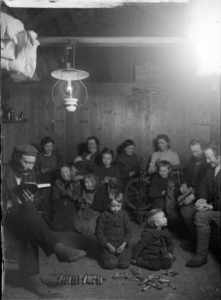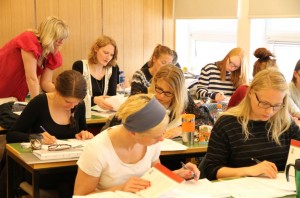1. Emotions, Feelings, Empathy
 Emotions, feelings and empathy – often in connection with Theory of Mind – is a growing field of research in cognitive literary criticism. These subjects will be studied within medieval literature as well as in 20th and 21st century literature, both prose and verse. The historical understanding of the human body and mind will be emphasized as well as modern approaches drawing on theories within psychology, neurology, literature and linguistics.
Emotions, feelings and empathy – often in connection with Theory of Mind – is a growing field of research in cognitive literary criticism. These subjects will be studied within medieval literature as well as in 20th and 21st century literature, both prose and verse. The historical understanding of the human body and mind will be emphasized as well as modern approaches drawing on theories within psychology, neurology, literature and linguistics.
The aim is to:
- shed new light on characterisation and the interaction of fiction and culture
- gain a more comprehensive historical overview than we already have on the divergent attitude towards emotions, feelings and empathy, not only in particular works from different times but across literary genres as well
- to focus on affect and aesthetics of literary reception (e.g. emotions, feelings and empathy in regards to reader´s audio and visual reception)
- continue further empirical research on the subject, which has already begun.
2. Metaphors
 The study of metaphor is important in an Icelandic context because Icelanders can read their medieval literature with relative ease. Old Icelandic poetry (especially skaldic poetry) is to a large extent characterised by “kenningar”, combining metaphor and metonymy in different ways. The study of metaphors will be both within the field of medieval and modern literature, but the main focus will be on:
The study of metaphor is important in an Icelandic context because Icelanders can read their medieval literature with relative ease. Old Icelandic poetry (especially skaldic poetry) is to a large extent characterised by “kenningar”, combining metaphor and metonymy in different ways. The study of metaphors will be both within the field of medieval and modern literature, but the main focus will be on:
- metaphors in thought and language from the perspective of cognitive linguistics, with special emphasis on language change
- the interplay of metaphors and other cognitive aspects (metonymy, humour etc.)
- distinctive features of metaphors in certain works of fiction and a possible rebellion against the prominent literary tradition, including innovation in the making of metaphors
- how certain values and paradigms of culture appear in the metaphors from different eras
- the propaganda elements of metaphors and the responsibility of their usage.
3. Cognitive Sociolinguistics
 Cognitive sociolinguistics is a novel field of research into the socio-cognitive dimensions of language at a usage-based level. The social and conceptual aspects of language-internal variation will be investigated on an empirical basis by means of advanced corpora and language surveys. This aspect of the project will profit from the experience of several large-scale empirical and theoretical projects on language variation which have been operating in Iceland in recent years. The focus will be on the following main areas:
Cognitive sociolinguistics is a novel field of research into the socio-cognitive dimensions of language at a usage-based level. The social and conceptual aspects of language-internal variation will be investigated on an empirical basis by means of advanced corpora and language surveys. This aspect of the project will profit from the experience of several large-scale empirical and theoretical projects on language variation which have been operating in Iceland in recent years. The focus will be on the following main areas:
- lexical and lexical-semantic variation
- constructional variation
- lectal attitudes and acquisition
- cognitive cultural models
- the ideologies of sociopolitical and socio-economic systems.
4. Narration
 Various research in cognitive literary criticism on the connection between author/ implied author and narrator – as well as research on voices – will be followed up with a focus on cognitive historicism, the connection between oral and written storytelling (cf. the unique “life” of various sagas throughout the centuries) as well as gender studies.
Various research in cognitive literary criticism on the connection between author/ implied author and narrator – as well as research on voices – will be followed up with a focus on cognitive historicism, the connection between oral and written storytelling (cf. the unique “life” of various sagas throughout the centuries) as well as gender studies.
This will include research on:
- interplay of poetry and narrative
- how the cultural uniqueness of narrator affects his narration
- the fuzzy boundaries between author and narrator
- the concept of the implied author
- the linguistic characteristics of narrative texts, including such syntactic phenomena as Verb First structures signaling cohesion in a narrative context (Narrative Inversion).
5. Second Language Acquisition
 Research of the development of Icelandic as a second language using cognitive theories will be carried out under the rubric of the Centre. The development of Icelandic as a second language will be analysed from a linguistic perspective and using processing theories that explain the developmental sequences and the cognitive processes behind them. Additionally, second language development will be studied in combination with other cognitive processes. This will include research on:
Research of the development of Icelandic as a second language using cognitive theories will be carried out under the rubric of the Centre. The development of Icelandic as a second language will be analysed from a linguistic perspective and using processing theories that explain the developmental sequences and the cognitive processes behind them. Additionally, second language development will be studied in combination with other cognitive processes. This will include research on:
- development of case and other grammatical features in Icelandic as a second language
- connection between personality, learning strategies and success in SLL
- connection between SLA and language impairment
- connection between SLA and defence mechanisms.